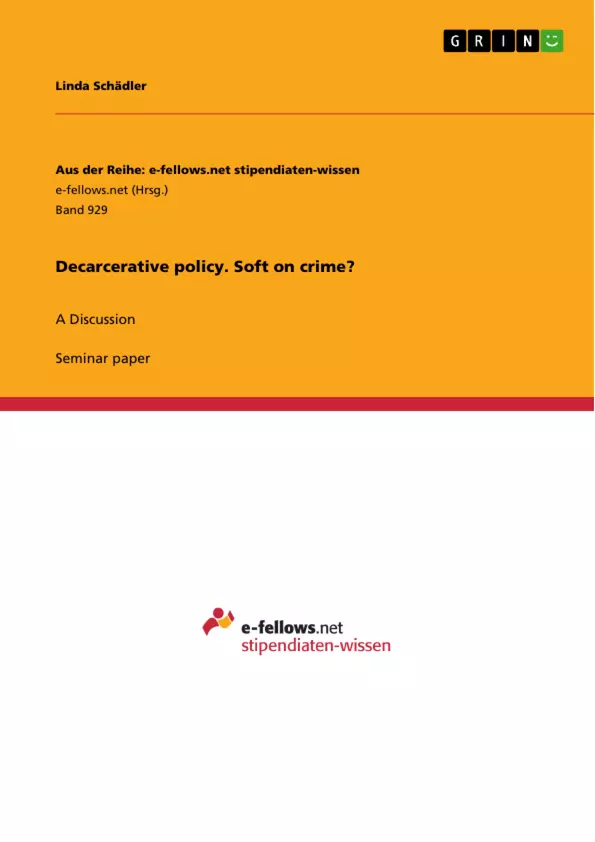When it comes to sentencing offenders, the general public is quick to demand the highest possible sentencing available, and tends to focus on retaliation and public security rather than resettlement. Prison sentences are seen as the default solution for all kinds of offenders, and prison is often considered a place which best addresses the needs of both offenders and the general population. Yet, prisons are overcrowded, expensive and proven to produce high reoffending rates – and they are definitely not the best option everyone. Alternative models, such as community sentences, on the other hand, have a reputation of being too ‘soft’ on criminals, i.e. not meeting the public’s expectations in terms of punitiveness, and its effectiveness is often doubted. Rather than interpreting ‘soft on crime’ in the sense of public perception, I will relate this to its effectiveness in terms of reoffending rates. In the following I would thus like to analyse in how far a decarcerative policy in respect of female offenders might help address the special needs of female offenders better and, thus, help stop them from reoffending. I will first focus on them make-up of the women’s prison population, then turn to the situation of women in prison in order to tie this in with reoffending rates, and finally point out some ways to improve the current situation.
Inhaltsverzeichnis (Table of Contents)
- Introduction
- The Make-Up of the Women's Prison Population
- Women in Prison
- The Harsh Conditions in Prison
- The Need for Alternatives
- Community-Based Alternatives
- Conclusion
Zielsetzung und Themenschwerpunkte (Objectives and Key Themes)
This paper explores the effectiveness of a decarcerative policy for female offenders. It investigates whether such a policy can better address the special needs of female offenders and ultimately reduce reoffending rates. The paper considers factors such as the makeup of the women's prison population, the challenges women face in prison, and the potential benefits of community-based alternatives.
- The increase in female incarceration and its implications.
- The unique needs and challenges faced by female offenders.
- The negative impacts of prison on women's lives and well-being.
- The potential of community-based alternatives for reducing reoffending.
- The limitations of traditional sentencing practices in addressing women's needs.
Zusammenfassung der Kapitel (Chapter Summaries)
This paper examines the effectiveness of a decarcerative policy for female offenders, arguing that a softer approach might be more successful in addressing their needs and reducing reoffending rates. The paper begins by exploring the demographics of the women's prison population, noting the rise in female incarceration despite women committing less serious and less frequent offenses than men. The paper then delves into the harsh realities of prison life for women, highlighting the overcrowding, inadequate facilities, and lack of specialized programs. These conditions are argued to negatively impact women's well-being and increase the likelihood of recidivism.
The paper then explores community-based alternatives, acknowledging their limitations but ultimately proposing them as a more suitable approach for addressing the unique needs of female offenders. The paper concludes by advocating for a more individualized approach to sentencing that prioritizes rehabilitation and support, rather than punitive measures.
Schlüsselwörter (Keywords)
The paper focuses on the following key terms: decarceration, female offenders, reoffending rates, prison conditions, community sentences, rehabilitation, social capital, women's needs, and individualized sentencing.
Frequently Asked Questions
What is a decarcerative policy?
It is a policy aimed at reducing the reliance on prison sentences, focusing instead on alternative models like community sentences to address offending behavior.
Why is prison often unsuitable for female offenders?
Prisons are often overcrowded and lack specialized programs for women, who typically commit less serious crimes and have unique resettlement and social capital needs.
Are community sentences "soft on crime"?
While the public often perceives them as lenient, the paper argues they are more effective in reducing reoffending rates by addressing rehabilitation rather than just retaliation.
What impact does incarceration have on women's well-being?
Harsh prison conditions and separation from family can severely damage a woman's well-being and social ties, which often increases the likelihood of recidivism after release.
What is the goal of individualized sentencing?
Individualized sentencing prioritizes the specific needs and rehabilitation potential of the offender, aiming to stop the cycle of reoffending more effectively than traditional punitive measures.
- Citation du texte
- Bachelor of Arts Linda Schädler (Auteur), 2012, Decarcerative policy. Soft on crime?, Munich, GRIN Verlag, https://www.grin.com/document/274945



